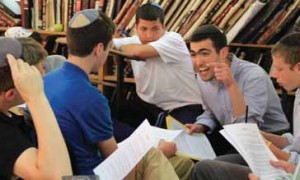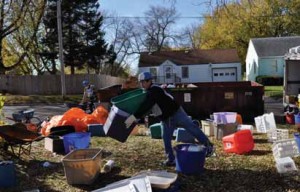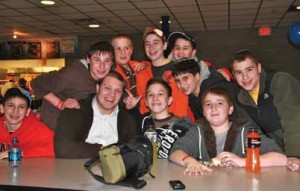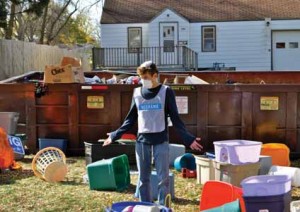NCSY Regional Directors Share Strategies on Raising Children to Love Judaism
Jewish Action interviewed NCSY regional directors across the country and asked the following questions:
How can we reach and inspire our children?
What are the most effective ways to instill a passion for Judaism in our youth?
Is a different approach necessary to reach the current generation of frum adolescents?
Interviews transcribed and edited by Bayla Sheva Brenner, senior writer in the OU Communications and Marketing Department
Rabbi Tzali Freedman
Nothing can replace the personal example of parents. Nothing engenders a more meaningful impression on a teen than watching his parents engage in chesed, learn Torah with enthusiasm and daven with passion. There’s no question that teens who grow up seeing their parents do for others are going to be more sensitive, giving, and caring Jews. Parents know this instinctively; they need to act on it.
Parents need to make the Shabbat table a meaningful experience. It means more than just showing up; it means thinking about what kind of conversations you want to have, which zemirot to sing, et cetera.
If you want young people to love Judaism, you have to build their selfesteem and show them that you believe in them. About ten years ago, there was a boy, a really great kid, who did something very foolish at an NCSY convention. At the end of that convention, Rabbi Steven Burg, then the Detroit chapter director who knew the boy in question for many years, asked him if he wanted to be the next chapter president. “Why?” he asked incredulously. Rabbi Burg answered, “I believe in you.” That NCSYer turned out to be one of the best chapter presidents we ever had, and today, he is a young married man and a leader in his community. That young man will tell you that the discussion he had with Rabbi Burg was a life-changing conversation. You set the bar high for a teen, and he or she will live up to those expectations.
Life is so hectic today. So many parents don’t give their children the undivided attention so critical to fostering self-esteem. At the same time, parents are also competing for their children’s attention. Teens come to events with their cell phones and iPods. Even when you have their attention, you don’t have their attention. Interacting with them on Shabbat when they’re not carrying their cell phones is such a different experience. But the minute after Shabbat, they are plugged into everything all over again. Anything that we can do to effectively remove kids from these distractions and give them real attention is critical. We have to show our youth the joy of the face-to-face, neshamah- to-neshamah connection and instead of living in distraction, they’ll live in the moment.
Rabbi Tzali Freedman is the regional director of Central East NCSY.
Rabbi Micah Greenland
Teens are open in a way no other age group is. For the first time in their lives, they are able to assert their independence and to formulate their philosophies. This is true whether they are coming from a frum or secular background. And teens tend to formulate decisions primarily as a result of their experiences. Thus, there needs to be a focus on the experiential.
It’s also important not to underestimate the power of personal relationships. If you give a teen some time and pay attention to what he is asking, it could make a profound difference in his life and in his choices. I once met a girl who had gone to day school and had had a pretty rocky ride. By the end of her stint at day school, she was nearly ready to toss her Judaism altogether. At an NCSY weekend, a particular rabbi responded to her questions, giving her as much time as she needed. It was as though a light bulb went on. She decided that there is too much here to throw it all away. She went to a seminary in Israel, and she is today an observant young woman.
Rabbi Micah Greenland is regional director of Midwest NCSY.
Rabbi Effie Goldberg
While we have a mesorah from Har Sinai, there is, unfortunately, no mesorah on how to convey the mesorah. I have found, however, that if one wants to reach a teenager, it is critical to be able to “tune” into him or her. Each kid is different. With some, I learn Chovot Halevavot, others Gemara, still others
Iggeret HaRamban.
When I meet a new teen, I want to understand who he is. I want to know what Judaism means to him. My relationship with teens is non-agenda based, nonthreatening. I show an interest in them. I don’t hug a guy and feel for his tzitzit.
Many kids view Judaism as being restrictive, including a long list of things one cannot do. They hear too much about the negative and not enough about the positive. They need to understand the reasons behind the mitzvot. We can’t just teach them about negiah, not being able to touch a member of the opposite sex; we need to teach them about relationships. We can’t just teach them about not eating treif; we have to teach them how kosher food affects the soul.
Oftentimes the day school kids and the public school kids inspire one another. At Shabbatonim, teens will stand up in front of their peers and share their personal struggles. The day school kids sit there thinking: This isn’t a rabbi speaking. It isn’t a rebbetzin. It’s a kid my age who has his own personal struggles, and this is where he is today.
A public school student who became observant through NCSY spoke at a recent Shabbaton. The next day, I received an e-mail from one of the day school teens who had attended the event—a girl who was completely disconnected from Judaism. She said that the young girl’s words “were the most inspiring” she had ever heard in her four years of yeshivah high school. It helped her appreciate what she had and to make the decision to spend a year learning in Israel.
Rabbi Effie Goldberg is regional director of West Coast NCSY.
Marc Fein
We can’t assume that because a kid grows up frum, he is going to remain frum. We have to constantly impress upon our youth the importance of living a life of Torah and mitzvot. How do we do that? We need to recognize the way one connects to Judaism. Some people connect through intellect, others through emotion—singing and dancing. If a young person is into environmentalism, teach him everything the Torah has to say on the subject. Many kids aren’t aware that Judaism has a perspective on many contemporary issues. Other kids are into social justice or tikkun olam. The more they learn about what Judaism has to say about various issues, the more they will see it as a value system they can identify with.

NCSY kids in an animated Torah discussion
It is also a mistake to emphasize purely religious development. You need to take a holistic approach. If social and emotional health isn’t there, then when religious growth occurs, it will be built upon a faulty foundation.
Being an adolescent is hard. Teens—frum or not—all attempt to find answers to the same kinds of questions: Why do I feel lonely? Is anyone else like me? What do I want to be? What do I believe in? For today’s adolescent, the loneliness is intensified by the fact that everyone else seems to be more connected because of technology.
We also need to realize that guilt doesn’t work anymore. The escalating rate of intermarriage and the Holocaust are themes that do not motivate today’s teen. Kids can tell when we are there for them and when we are there for ourselves. If we are here for ourselves because we are worried about the future of the Jewish community, then why would they buy it?
If after going through the day school system, a young person wants to continue to grow in his Judaism, that’s success. But if a kid spends twelve years in a Jewish day school, but never felt inspired or part of a community, or never felt people truly care about him, then he may choose to opt out. Of course, even with kids who drop out of Judaism, one needs to take a long-term perspective. One can always come back. We should never write off someone as totally lost. If given a welcoming entry back in, one can always return.
Marc Fein is regional director of Upper New York NCSY.

Rabbi Yaakov Glasser, New Jersey’s regional director, sharing a post-Shabbat inspirational story at a Shabbaton.
Rabbi Eitan Katz
One effective way to inspire passion for Judaism is to teach kids about Jewish heroes; I give kids books about heroes of the Holocaust, and heroes who
fought to establish the State of Israel as well as Prisoners of Zion in the former Soviet Union, et cetera. It opens their eyes, making them realize they shouldn’t take their Judaism for granted.
Also, we need to realize that teens have questions. A typical question a teen might ask is, “Why did God create sexual urges that we are not allowed to
act upon?” The answer he or she might get is, “That’s not for us to question.” A teacher might not know how to respond and avoid difficult questions altogether, leaving the student feeling at best invalidated, and at worst, ashamed. Kids need to be able to ask and discuss questions. At NCSY, we let them ask questions. They might like the answers, they might not like the answers, but at least the questions get discussed. Of course, some questions have no answers. One of the best answers one can give a kid is, “Your question is excellent, but I don’t know the answer.”
Kids also have to know that other people have the same question and they still go on believing even though they may not have the answer to it. I do not understand why the Holocaust took place, but I still put on tefillin every day. One’s relationship with God is like one’s relationship with a parent. We may understand only 90 percent of what our parents do, but we must trust that the 10 percent we don’t understand is for our benefit as well. So too is our relationship with God. One must believe that God, like our parents, has our best interests at heart.
Rabbi Eitan Katz is the assistant regional director of New Jersey NCSY.
Rabbi Glenn Black
One should be able to judge Judaism by those who practiceit. But this is not always the case. Teens are oftentimes brought up seeing adults living lives devoid of idealism.This prevents them from seeing the true ta’am of a Jewish existence. In many of our communities, shuls are rated bythe amount of socializing that takes place and the qualityof the Kiddush clubs, rather than by the level of kavanah during tefillah, the rabbi’s derashah, or the congregants’ in-volvement in chesed. Often times parents prefer that their children daven in the teen minyan, so that they won’t see them talking during davening. If adults would appreciate that the eyes of the next generation are on them, they might choose to behave differently.
Life today is also extremely complicated. In many homes, both spouses are working; people are busy. Unfortunately, who is sacrificed in all of this? The youth. They don’t get their parents’ attention, and at school, with thirty kids in a classroom, they are one of many. We need to remind people who are role models by virtue of their positions–parents, older siblings, educators, community leaders—that if they exhibit a passion for Judaism, this will rub off on the teens under their charge. It’s not hard for a teen to be inspired; we’re simply not doing enough to inspire them. I’ve dedicated my life to this age group. I believe with all of my heart that if you can turn on one young person, you can turn on a generation.
Rabbi Glenn Black is NCSY director of strategic planning.
Rabbi Yaakov Glasser
Why is there a lack of passion? Number one, there is a complacency that sets in. Like anything in life, over time, when something loses its freshness, the excitement and passionfor it erode as well. Secondly, many students struggle with their commitment to observance and Torah, despite their years of Jewish education. While formal education speaks to the informational aspect of Judaism; it does not speak to the experiential aspect. Enthusiasm for Judaism cannot be measured in grades and cannot be evaluated using the traditional academic modes of measuring success. Thirdly, we need to appreciate what the youth of today face. They are growing up with much greater challenges than we ever had to contend with. The stimulation that exists outside of the religious and spiritual framework is completely overwhelming in comparison to even ten years ago. It’s no longer just television, movies and socializing; there is a gamut of stimulation that is now available to any teen through modes of communication accessible at anytime and any place.
Teens need to feel they are making a difference. Unless we make Judaism a personally moving experience, they’ll continue turning to alternatives. We recently took a group of frum students to Rochester, Minnesota, a community that had suffered catastrophic flooding. They spent a day cleaning out an eighty-nine-year-old woman’s home that had been destroyed in the flood. Then they visited the small local Jew-ish community, and taught the students at the school. One morning during our stay, at the conclusion of Shacharit, the local Chabad rabbi was moved to tears. He explained to us that he’s had a minyan on a weekday morning four times in the last twelve years. The kids on the trip were from Teaneck, New Jersey, where there are probably some forty minyanim every morning. All of a sudden, to these teens, chesed meant something more than just putting money in the tzedakah box and being part of a minyan meant something bigger too. These experiences—the rebuilding of someone’s home, and providing the opportunity for tefillah betzibbur— awakened something very powerful within the kids.

A flood of Kindness: NCSY teens from Teaneck, New Jersey, traveled to Rochester, Minnesota, to help clean up the city in the aftermath of catastrophic flooding.
Such an approach can be replicated on an ongoing basis. We run programs where religious and non-religious teens get together for singing and zemirot Friday nights and for learning sessions. In such a setting, the devar Torah that the yeshivah kids learned in school becomes an opportunity to impact others. We turn the student into the teacher. Frum kids need to be empowered to make an impact. We have to be willing to create Jewish experiences that break the mold. Judaism shouldn’t become something that is passive; kids should not just sit in the classroom and take and take. They need the opportunity to contribute, to give, to make a difference, to make their mark.
Rabbi Yaakov Glasser is regional director of New Jersey NCSY.
Rabbi Israel Lashak
The personal relationship counts.Young people today live in a world of texting and Facebook, where a boyfriend can drop a girlfriend via a text. They’ve become used to virtual relationships. We have to give them genuine, real-life relationships—take them out and play soccer and basket-ball, make a bonfire, tell stories.
Instead of talking, let them talk. Teens don’t often get to talk about the issues that matter to them the most. They want and often need to discuss their feelings, hopes and fears.
Weekend and week-long trips to Orlando or Yellowstone National Park, or longer summer trips to Israel or Prague have proven to be a great way to forge a deeper connection to Judaism. A day event is great, a three-day Shabbaton is better, a week in Costa Rica is even better. Shabbat in a far-away place is very powerful. Lighting Shabbat candles, singing zemirot, and learning Torah in a foreign environment allows these kids to get off the treadmill of the daily grind and appreciate more deeply that we are unique among the nations and have a wonderful moral mission to mankind.
Such experiences can change lives. A day school teen who had become disillusioned with Judaism attended NCSY’s Eurotrip under a lot of parental pressure. The trip included visits to Spain, Portugal, Gibraltar, Italy and Israel. During Tishah B’Av, we actually sat right near the Arch of Titus in Rome. We followed the Rambam’s life path from Cordoba all the way to Tiberias. This was an incredible experience for him. He had found religion boring and suffocating; the trip made it relevant and alive. At the close of the trip, this boy, who had before stopped keeping Shabbat and kashrut, told me he wants to learn in a yeshivah in Israel. It’s been four years and he’s still learning there.
Rabbi Israel Lashak is regional director of Southwest NCSY.
Tovah’s Story
I come from a religious family. I was always a good kid, but I never did well in school. I don’t have any learning disabilities. I just learn at a slower pace. My teachers said I was lazy and didn’t care, which made me feel frustrated. I didn’t feel accepted in school or at home; I became kind of a loner. Eventually, I found friends who felt the same way I did and began hanging out with them. I started not keeping Shabbos and rebelled against everything.
One of the friends I hung out with told me about NCSY’s Latte and Learning. He said: “I go there once a week; it’s so much fun.” I asked, “Is it a Jewish thing?” He said, “Yeah, but it’s very chilled.” I went, thinking it was a great way to get out of the house. When my parents found out it was a Jewish event, they, of course, wanted me to go.
It was really cool. It was a very open atmosphere; I didn’t feel stressed out because I wasn’t wearing a skirt. Eventually, I decided to go on an NCSY Shabbaton. One thing that really touched me is that at the end of the Shabbaton, all the advisors go around to the kids and say, “Do you have my number? Call me whenever you need to.”
At my first NCSY regional, before Shabbos started, the regional director told us we are all keeping Shabbos together—no phones, no Internet, no straightening your hair. I kept Shabbos for the first time in a long while. I loved it. Once I got back home, I felt a spiritual high from the fun I had while doing things that were religious. It made me feel happy to be Jewish. I had found a way to connect with God and thought: Why not try this? I decided to drop my old friends and made new ones who were more open to accepting me as a religious person. I wanted to keep Shabbos and wear skirts. I started learning Torah. I let people into my life who wanted to help me.
I am now an observant Jew and feel Hashem is my best friend.
But it was very hard for me after all the negative things I had done. Sometimes, I would sit down, think about them and cry. An NCSY advisor told me a great mashal (parable) to explain the relationship between a person and God. There is a rope. Sometimes God is pulling the rope closer to Him and sometimes you’re pulling the rope, because you want to be closer to Him. When you do something really bad, the rope gets cut. Then you do teshuvah and say you’re sorry, and tie both ends and the rope gets shorter. Every time you do something where the rope gets cut and you tie it back together, you get closer and closer to Hashem. When I heard this mashal, I felt so much better. I’ve tied the knot to that rope so many times that I’m practically touching Hashem.
A lot of parents just don’t know what to do when their kids go off, so they give up. My parents were never embarrassed of me and stuck with me the whole way. We got into a lot of fights, but at the end of the day, they really truly love me. As much as I didn’t see it before, I see it now.
Yaakov’s Story
I grew up in a frum home with a lot of emphasis on conforming. The problem for me was that no reasons were given for doing what we were doing. Everything seemed pointless. My parents didn’t demonstrate that a religious life is one of meaning or that they loved what they were doing. When I turned fourteen, I began feeling there was no purpose to my life; nothing made sense. I questioned if God existed. There were issues at home—a lot of fighting between my parents and between my parents and me. There were economic troubles as well. At home, the attitude was: “Don’t ask questions.” If I was in shul and wasn’t davening correctly or just not davening, spacing out, I would get yelled at—“Why aren’t you davening?” “Why aren’t you doing this?” “ Why aren’t you doing that?” If you grow up that way, why would you want to be religious?
In ninth grade, I went to four different yeshivas. I was asking questions like, “Can you prove that God exists?” And, “Why are we doing all of this?” I was told, “If you have such questions, this is not the right place for you.” In the second yeshivah, which was out-of-town, I told the rabbi that I hated life and didn’t want to be Jewish. He told me to call my father and get on a plane to go home. In the third yeshivah, I just wasn’t interested in making it work. We tried one more time–I lasted a week in that yeshivah. I walked out. I was done.
I was angry at the world. I stopped wearing a yarmulke; no longer kept Shabbos or kosher. It scared my parents, to say the least. I spent the next three years angry and depressed. I worked a little bit, did odd jobs. I tried to understand the meaning of life, but not necessarily within the religious mindset.
There was a lot of talk when I was at that stage about “kids at risk.” My friends and I hated that label. We didn’t like the word “rebelling” either. It wasn’t that we were at risk; we were searching for answers and not getting any. We were trying to understand the world around us, and no one was helping us.
I had a mentor who pushed me to get involved with NCSY. I went to an NCSY event and started to meet people who tried to answer my questions. I was inspired, not from the responses necessarily, but from the way they responded. An arm was put around my shoulder and I was told, “Let’s try and explore this together.” Rabbi Micah Greenland, regional director of Midwest NCSY, helped me a lot. At eighteen, I went to Israel to a yeshivah program for teens like me. For the first time in my life I met religious Jews who spoke to me in a way that made sense; they weren’t preaching. They told me, “The questions you have are good questions. We may not have the answers, but there might be people who do.”
I stayed in that yeshivah for three years and started to see the beauty in Judaism. I was able to make a rational decision about my understanding of the Torah. It seemed to me that it was best way to live one’s life. I was ready to return to Judaism.
Over time, I accepted the fact that certain fundamental tenets of Judaism require a leap of faith. I looked at the world and thought, How can this be if it wasn’t for a Creator? I slowly took on more and more aspects of observant Judaism, keeping Shabbos, keeping kosher. I have yet to get answers to all my questions. I will always be a truth-seeker. I don’t see a meaning to life if you’re not searching for the truth and a purpose.


